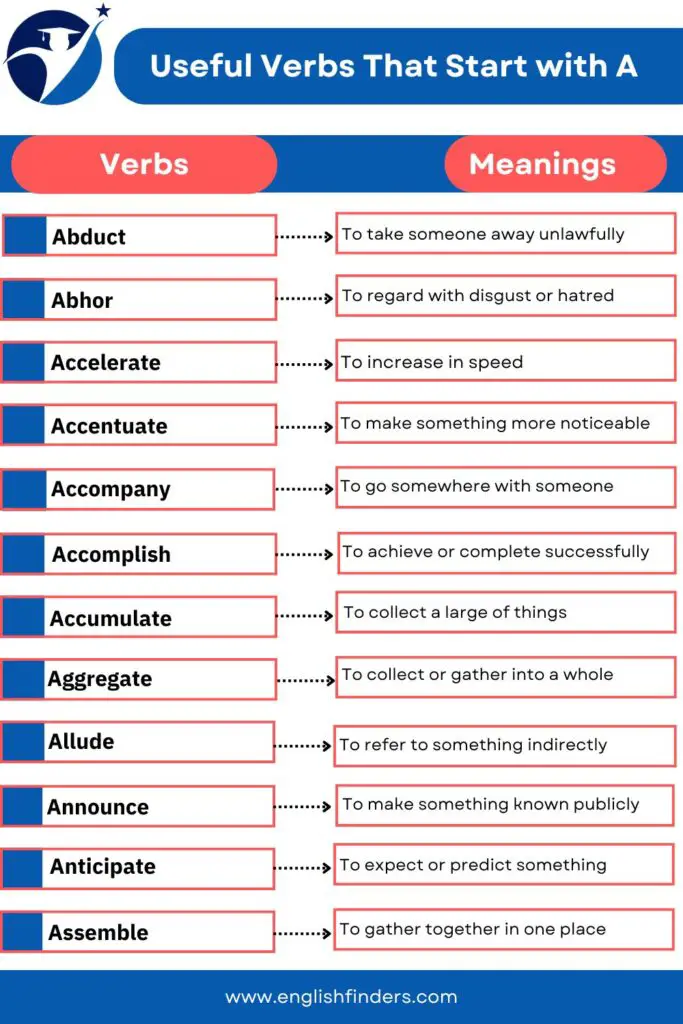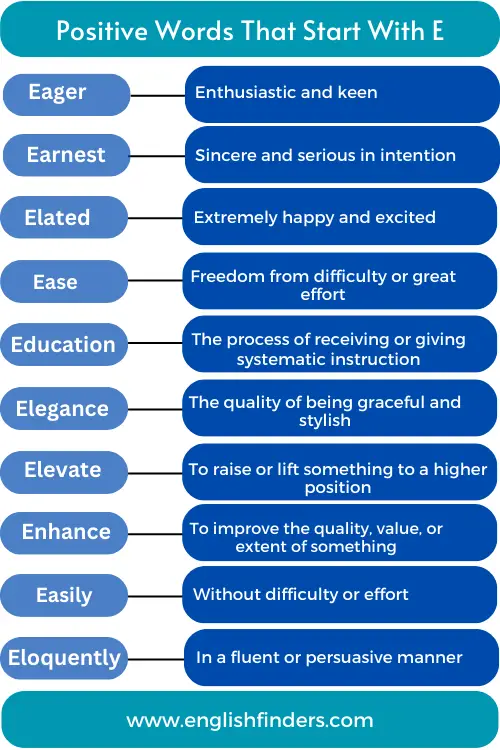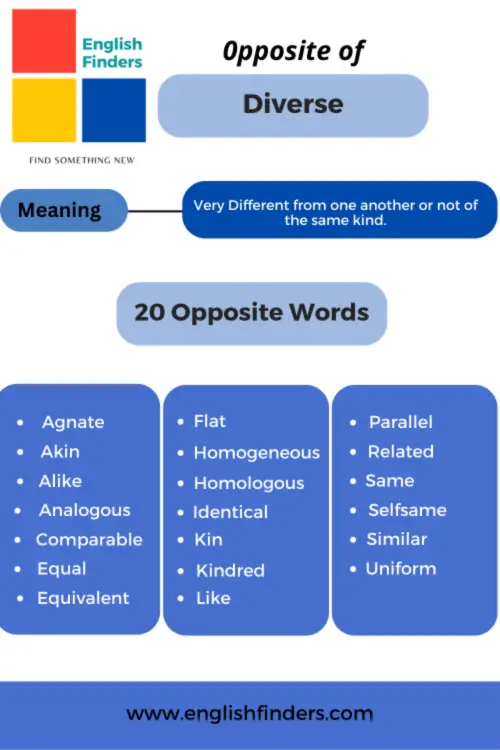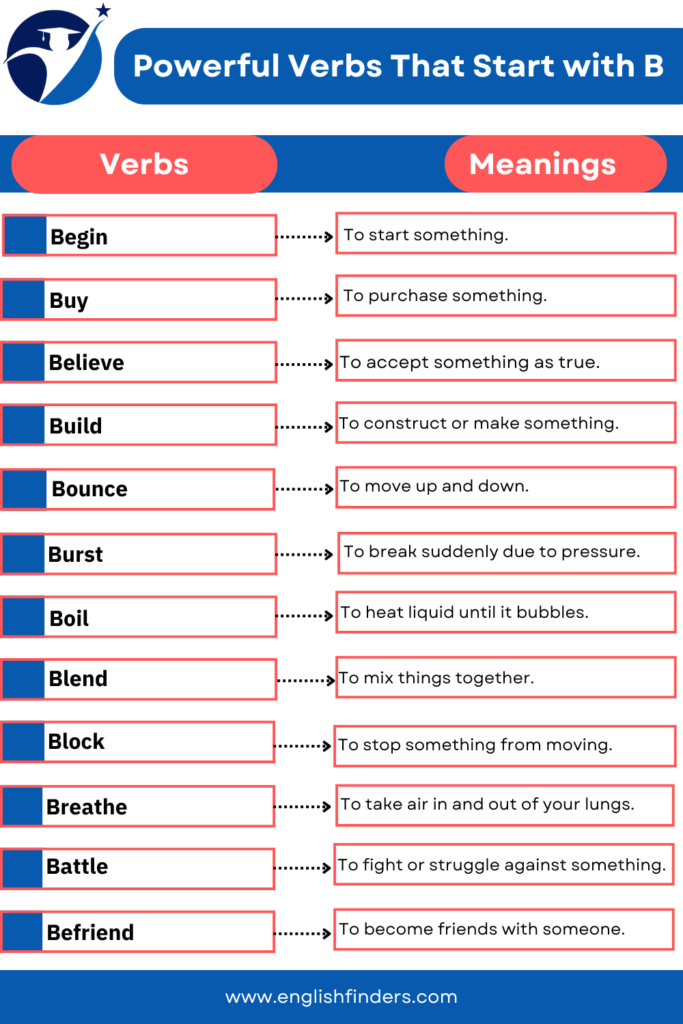Last updated on April 25th, 2025 at 04:07 pm
Verbs are the backbone of any sentence—they bring action, movement, and meaning to our words. If you’re telling a story, giving instructions, or sharing your thoughts, verbs help you express yourself clearly. In this lesson, we’ll explore 50+ verbs that start with A, their meanings, and how to use them in sentences.
Learning new verbs is an excellent way to improve your English vocabulary. The more verbs you know, the easier it becomes to speak and write fluently. Understanding how to use these verbs in different situations will also boost your vocabulary. So, let’s dive into some useful verbs that start with A and learn how to use them in different types of verb tenses!
50+ Useful Verbs That Start with A
Quick Navigation
Let’s explore 50+ useful verbs that start with A.
| Verb | Meaning | Example |
|---|---|---|
| Abandon | To leave someone or something behind | After the storm, the village was abandoned. |
| Abbreviate | To shorten a word or phrase | It’s common to abbreviate “Doctor” as “DR.” |
| Abduct | To take someone away unlawfully | The movie depicts a scene where aliens abduct a group of teenagers. |
| Abhor | To regard with disgust or hatred | I abhor violence in any form. |
| Accelerate | To increase in speed | The car began to accelerate as the light turned green. |
| Accentuate | To make something more noticeable | She has worn a necklace to accentuate her dress. |
| Acclimate | To adapt to a new environment or situation | It takes a while for him to acclimate to the cold weather. |
| Accompany | To go somewhere with someone | I will accompany you to the store. |
| Accomplish | To achieve or complete successfully | She is working hard to accomplish her goals. |
| Accumulate | To collect a large of things | Over the years, he managed to accumulate a lot of books. |
| Accuse | To blame someone for a mistake or crime | The detective branch accused him of stealing the money. |
| Acknowledge | To accept or recognize something | He has acknowledged his mistakes. |
| Acquire | To obtain or gain possession of something | Nisha hopes to acquire a new skill by taking classes. |
| Adapt | To adjust to new conditions | Animals often adapt to their habitats to survive. |
| Add | To combine or join one thing with another | Can you add the two numbers together? |
| Address | To speak to someone or deal with a matter | I need to address my concerns at the meeting. |
| Adhere | To stick fast to a surface or substance | You must adhere to the rules if you want to play. |
| Adjust | To change something slightly to achieve a desired fit or result | He adjusted his glasses to see better. |
| Administer | To manage or be responsible for | The manager will administer the project’s budget. |
| Admit | To confess or acknowledge something | He admitted that he made a mistake. |
| Adore | To love and respect someone deeply | She adores her grandparents and visits them often. |
| Advise | To offer suggestions about the best course of action | I advise you to study regularly for the test. |
| Advocate | To publicly support a particular cause or policy | She is an advocate for environmental protection. |
| Aggravate | To make a problem worse or more serious | His comments only served to aggravate the situation. |
| Aggregate | To collect or gather into a whole | The data was aggregated from various sources. |
| Agitate | To stir up public interest or concern | The protest was designed to agitate for policy change. |
| Alleviate | To make suffering or a problem less severe | The medication has helped to alleviate her pain. |
| Allocate | To distribute resources for a specific purpose | The school will allocate funds for new computers. |
| Allege | To claim something is true without proof | They allege that he committed the crime. |
| Align | To arrange in a straight line or correct position | Make sure to align the pictures on the wall. |
| Allude | To refer to something indirectly | She alluded to her past experiences in her speech. |
| Amaze | To surprise someone greatly; to astonish | The magician’s tricks never fail to amaze us. |
| Amend | To make minor changes for improvement | The law was amended to include new regulations. |
| Analyze | To examine in detail for purposes of explanation | Scientists analyze data to draw conclusions. |
| Announce | To make something known publicly | They will announce the winner at the ceremony. |
| Anticipate | To expect or predict something | She anticipated the outcome of the event. |
| Appeal | To make a serious or urgent request | The charity appeals for donations. |
| Appraise | To assess the value or quality of something | An expert will appraise the painting’s worth. |
| Apprehend | To catch or arrest someone who has not obeyed the law | The thief was apprehended by the police. |
| Approach | To come near or nearer to someone or something | As I approached the building, I noticed its grandeur. |
| Arise | To become apparent or emerge | Issues can arise when communication breaks down. |
| Arrange | To put in a proper order | I will arrange the flowers in a vase. |
| Articulate | To express an idea clearly and effectively | He was able to articulate his thoughts during the debate. |
| Ascertain | To find out or learn with certainty | The investigator is trying to ascertain the facts. |
| Assemble | To gather together in one place | We need to assemble the team for a meeting. |
| Assess | To evaluate or estimate the nature of something | They will assess the situation before making a decision. |
| Assign | To allocate a task or responsibility to someone | The teacher will assign homework for the weekend. |
| Assist | To help someone in doing something | I can assist you with your project. |
| Assume | To take for granted or without proof | Don’t assume that everyone understands the topic. |
| Astound | To shock or greatly surprise someone | The news of his promotion astounded his coworkers. |
| Authenticate | To prove something is genuine | The museum can authenticate the painting’s origin. |
Frequently Asked Questions
Why is it important to learn verbs that start with A?
Learning verbs that start with A expands your vocabulary, improves your sentence structure, and helps you express ideas clearly. Since verbs are essential for communication, knowing a variety of them allows you to speak and write more fluently.
How can I remember new verbs and their meanings?
To remember new verbs, try using them in daily conversations, writing short sentences with different tenses, and practicing with flashcards. Associating verbs with real-life situations can also help reinforce your memory.
What are some common verbs that start with A?
Some commonly used verbs that start with A include add, accuse, arise, assess, assign, appeal, advise, analyze, and announce. These verbs are useful in everyday conversations and writing.

Azizul Hakim is the founder & CEO of englishfinders.com. He is a passionate writer, English instructor, and content creator. He has completed his graduation and post-graduation in English language and literature.




